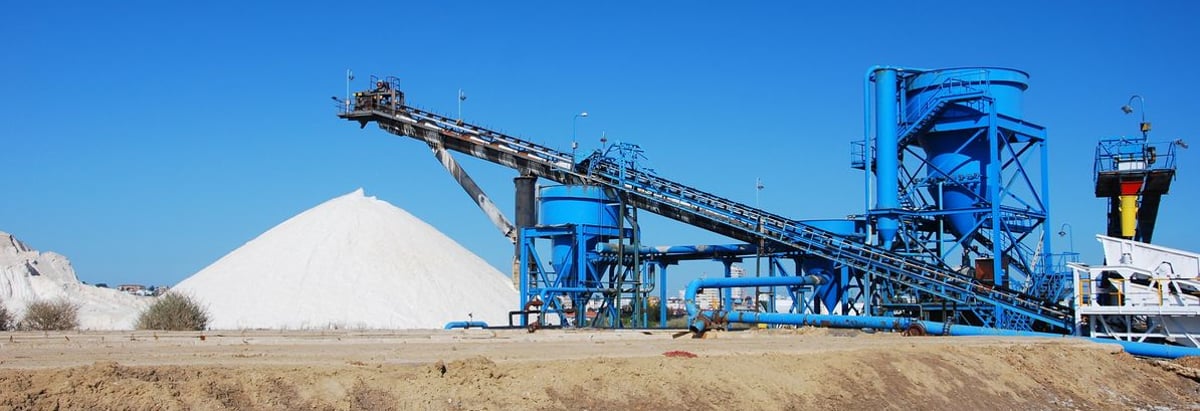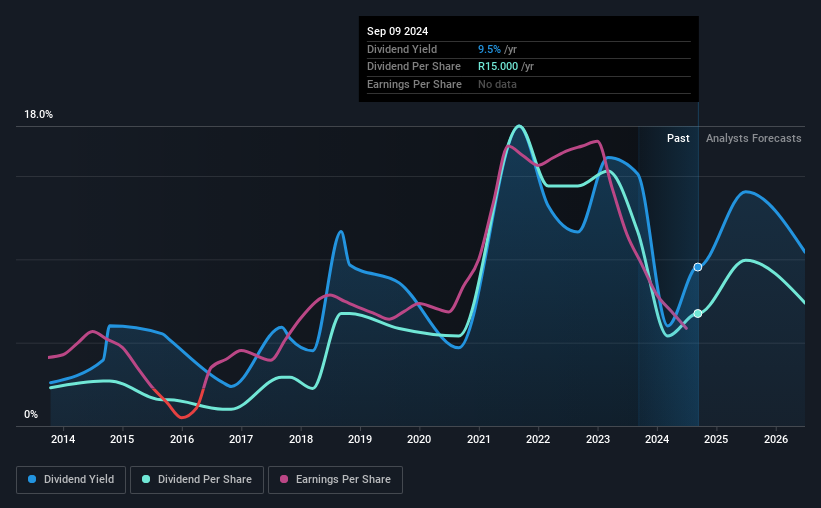
African Rainbow Minerals Limited (JSE:ARI) will pay a dividend of ZAR9.00 on the 7th of October. The yield is still above the industry average at 9.5%.
See our latest analysis for African Rainbow Minerals
African Rainbow Minerals' Payment Could Potentially Have Solid Earnings Coverage
If the payments aren't sustainable, a high yield for a few years won't matter that much. Before making this announcement, African Rainbow Minerals was paying out quite a large proportion of both earnings and cash flow, with the dividend being 225% of cash flows. Paying out such a high proportion of cash flows can expose the business to needing to cut the dividend if the business runs into some challenges.
The next year is set to see EPS grow by 124.1%. Under the assumption that the dividend will continue along recent trends, we think the payout ratio could be 49% which would be quite comfortable going to take the dividend forward.

Dividend Volatility
Although the company has a long dividend history, it has been cut at least once in the last 10 years. Since 2014, the annual payment back then was ZAR5.10, compared to the most recent full-year payment of ZAR15.00. This implies that the company grew its distributions at a yearly rate of about 11% over that duration. It is great to see strong growth in the dividend payments, but cuts are concerning as it may indicate the payout policy is too ambitious.
The Dividend's Growth Prospects Are Limited
With a relatively unstable dividend, it's even more important to see if earnings per share is growing. It's not great to see that African Rainbow Minerals' earnings per share has fallen at approximately 2.8% per year over the past five years. If earnings continue declining, the company may have to make the difficult choice of reducing the dividend or even stopping it completely - the opposite of dividend growth. It's not all bad news though, as the earnings are predicted to rise over the next 12 months - we would just be a bit cautious until this can turn into a longer term trend.
The Dividend Could Prove To Be Unreliable
Overall, it's not great to see that the dividend has been cut, but this might be explained by the payments being a bit high previously. The track record isn't great, and the payments are a bit high to be considered sustainable. We would probably look elsewhere for an income investment.
Investors generally tend to favour companies with a consistent, stable dividend policy as opposed to those operating an irregular one. At the same time, there are other factors our readers should be conscious of before pouring capital into a stock. Just as an example, we've come across 3 warning signs for African Rainbow Minerals you should be aware of, and 1 of them can't be ignored. Looking for more high-yielding dividend ideas? Try our collection of strong dividend payers.
New: Manage All Your Stock Portfolios in One Place
We've created the ultimate portfolio companion for stock investors, and it's free.
• Connect an unlimited number of Portfolios and see your total in one currency
• Be alerted to new Warning Signs or Risks via email or mobile
• Track the Fair Value of your stocks
Have feedback on this article? Concerned about the content? Get in touch with us directly. Alternatively, email editorial-team (at) simplywallst.com.
This article by Simply Wall St is general in nature. We provide commentary based on historical data and analyst forecasts only using an unbiased methodology and our articles are not intended to be financial advice. It does not constitute a recommendation to buy or sell any stock, and does not take account of your objectives, or your financial situation. We aim to bring you long-term focused analysis driven by fundamental data. Note that our analysis may not factor in the latest price-sensitive company announcements or qualitative material. Simply Wall St has no position in any stocks mentioned.
About JSE:ARI
African Rainbow Minerals
Through its subsidiaries, operates as a diversified mining and minerals company in South Africa, Malaysia, and Switzerland.
Excellent balance sheet and good value.
Similar Companies
Market Insights
Community Narratives




